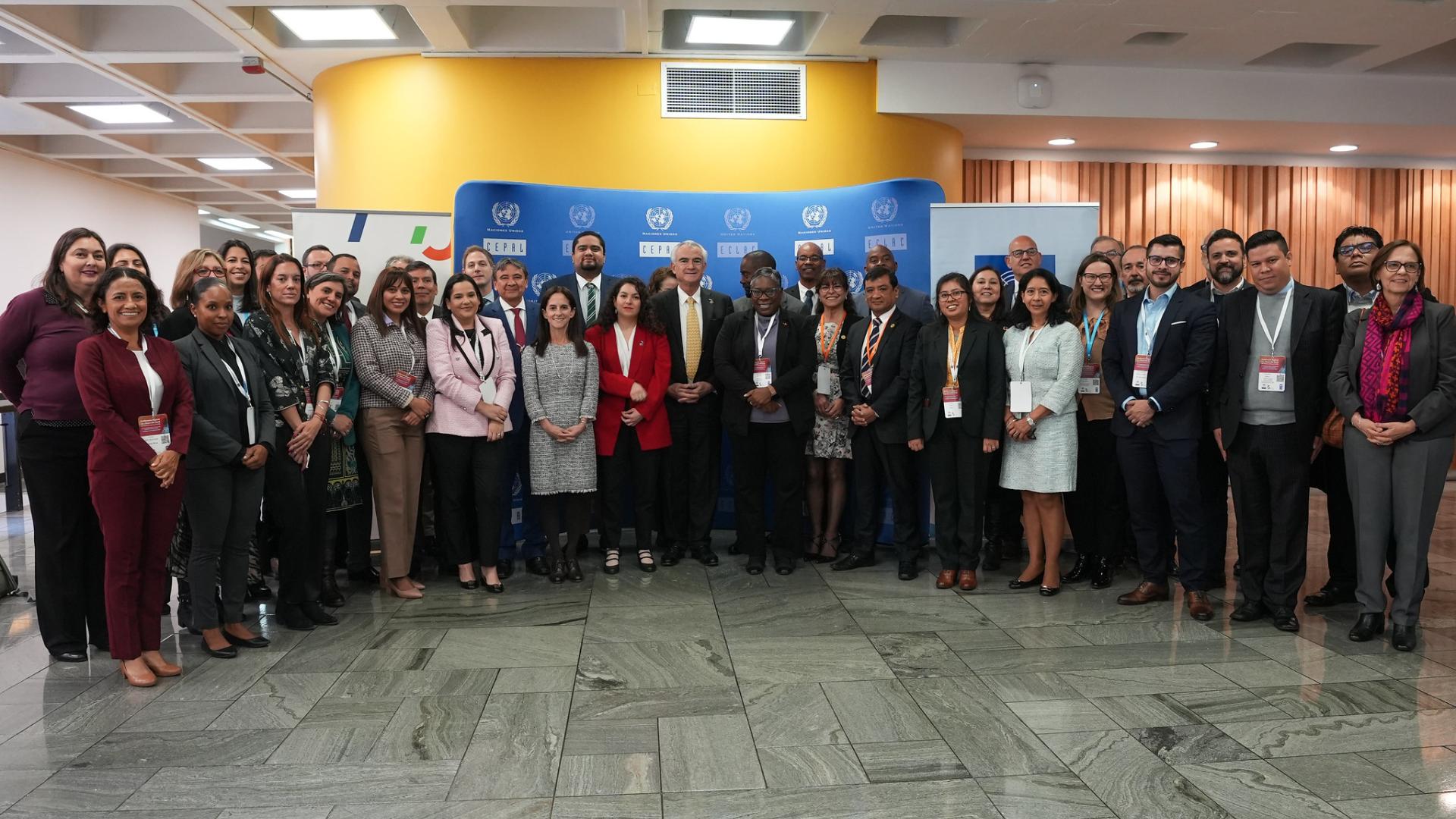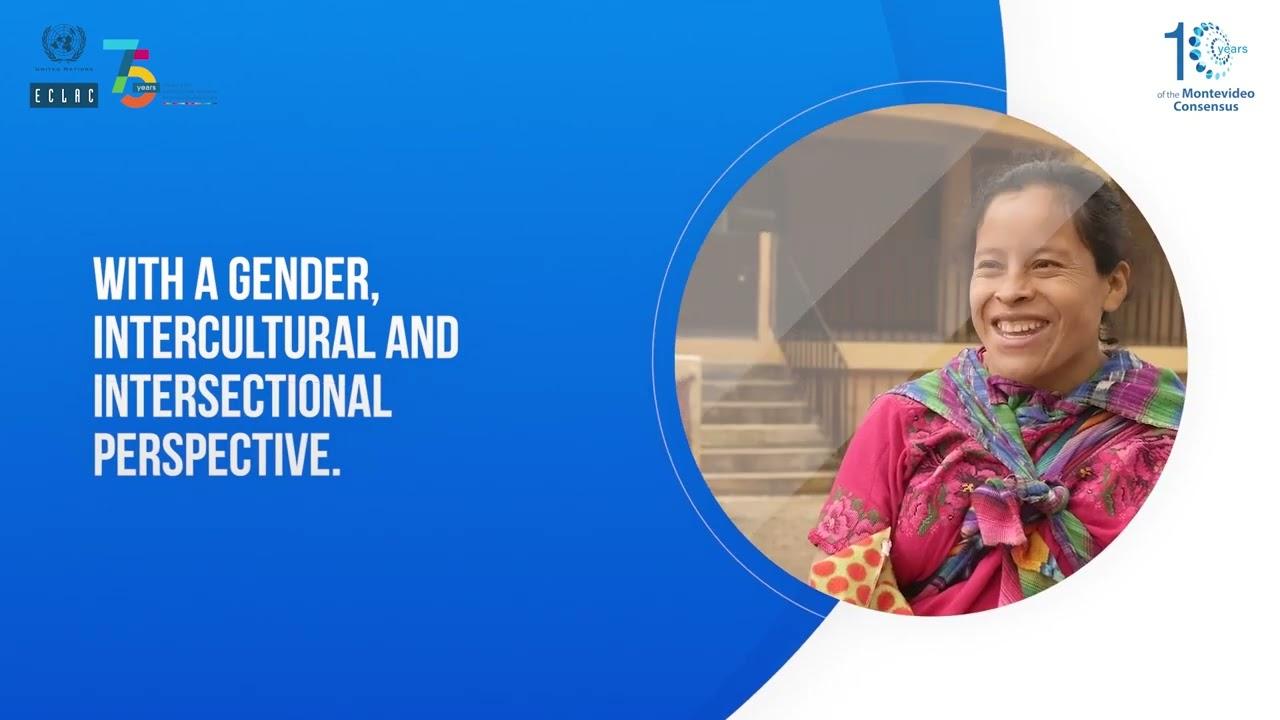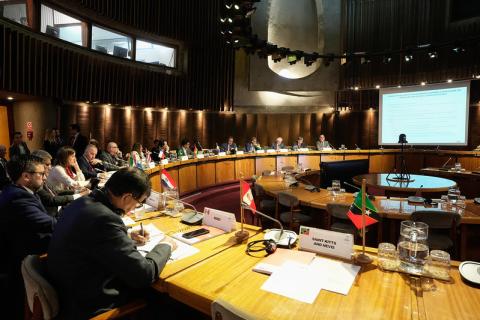Briefing note
The Executive Secretary of the Economic Commission for Latin America and the Caribbean (ECLAC), Alicia Bárcena, highlighted the important role played by the United Nations Economic and Social Council (ECOSOC) in building a renewed global compact to strengthen multilateralism and promote greater solidarity with middle-income countries on key issues such as debt and the transition to sustainable, low-carbon growth models.
ECLAC's highest authority participated this Friday, July 2, in a high-level meeting held virtually within the framework of the 2021 Integration Segment of ECOSOC, which – under the leadership of its Vice-President, Ambassador Juan Sandoval Mendiolea, Deputy Permanent Representative of Mexico to the United Nations – promotes a productive debate on the need for a renewed compact for integrating economic, social and environmental policies for the post-COVID-19 recovery and implementing the 2030 Agenda for Sustainable Development.
Bárcena spoke on Panel 2 of the event, entitled “Building back better towards inclusive, sustainable and just economies for recovery: Redesigning the contract between people and planet,” where she was joined by Guy Ryder, Director-General of the International Labour Organization (ILO); Inger Andersen, Executive Director of the United Nations Environment Programme (UNEP); José Antonio Ocampo, Chair of the 23rd session of the Committee for Development Policy (CDP); Julio Santaella, Vice-Chair of the 52nd session of the UN Statistical Commission; and Renato Zerbini Ribeiro Leão, Chair of the 69th session of the Committee on Economic, Social and Cultural Rights (CESCR).
The panel was moderated by Maria-Francesca Spatolisano, Assistant Secretary-General for Policy Coordination and Inter-Agency Affairs of the United Nations Department of Economic and Social Affairs (DESA), and also featured the participation of Walton A. Webson, Permanent Representative of Antigua and Barbuda to the UN and Chair of the Alliance of Small Island States (AOSIS), and Diego Pary Rodríguez, Permanent Representative of Bolivia to the UN and member of the Bureau of the Group of Landlocked Developing Countries (LLDCs).
In her remarks, Alicia Bárcena stated that “we require a multilateral forum to discuss the debt architecture, including the possibility of establishing a public rating agency, the full inclusion of middle-income countries in the G20 debt standstill initiative, and the use of innovative financial instruments such as hurricane clauses and SDG bonds. We require an additional redistribution of liquidity, beyond the Special Drawing Rights, so that countries – especially middle-income countries – can access concessional funds, markets, green funds and, above all, technologies at a low cost,” she said.
To this end, she explained that the development narrative must be changed so that it goes beyond GDP per capita and takes into account the specificities and development gaps of middle-income countries. “The 2030 Agenda is a landmark and shows us that only a multidimensional measurement can indicate levels of development. That is why it is so important to change the development narrative and include measurements that go beyond GDP per capita. We cannot change in order to remain the same. We must move from the culture of privilege to the culture of equality and sustainability,” Bárcena stated.
She added that to achieve a post-pandemic recovery from COVID-19 with more inclusive, just and sustainable economies, it is necessary to have equitable access to vaccines, maintain basic emergency income for the most vulnerable groups, close the digital divide for the 46 million households that do not have Internet, and connect the emergency with the medium term.
She reiterated that Latin America and the Caribbean is the region of the developing world that has been hit hardest by the pandemic: despite having just 8.4% of the global population, it accounts for a fifth of all reported COVID-19 cases and nearly a third of reported deaths. In addition, it is the most indebted region (at 77% of its GDP on average) and registers the highest external debt service, as a percentage of its exports of goods and services (59%).
“We face growing asymmetries between developed and developing countries, as well as a divergent recovery with unequal access to vaccines, financing, markets and technological capabilities,” she underscored. “As a predominantly middle-income region, Latin America and the Caribbean has not benefited from multilateral debt relief solutions and has limited access to concessional financing options, with particularly adverse effects for small and vulnerable economies, such as the Caribbean Small Island Developing States (SIDS),” she added.
Bárcena emphasized that “we are facing a lost decade with 203 million people living in poverty and 78 million in extreme poverty” and going through “a very delicate time.” “Countries have invested 4.6% of GDP to respond to the emergency and 2.5% of GDP in public credit guarantees to help contain major impacts, but this is a much lower amount than what Europe or the United States has invested,” she said.
She thus called for innovative solutions for a sustainable recovery and recalled the proposals that ECLAC has presented to countries for tackling the crisis: equitable access to vaccines (accelerating vaccination for all as soon as possible), maintaining basic emergency income for vulnerable households (at least one poverty line), closing the digital divide for those 46 million households (which would cost 1% of GDP), and addressing the region's external gap by promoting regional industrialization, moving away from the reprimarization of our economies.
In this regard, she indicated that one of the most important initiatives in the region – which is being carried out through the Community of Latin American and Caribbean States (CELAC), under the presidency of Mexico – is to accelerate the production of vaccines and medicines. “CELAC has asked us to do an in-depth analysis of national capacities for this, and that is what we are doing,” she said.
She also highlighted the agreement reached recently among the countries of the Organisation for Economic Co-operation and Development (OECD) to increase taxes on individuals and companies with more wealth. “Income and wealth must be redistributed using decisive actions. The developed countries grouped in the OECD made a historic decision: they have adopted a heterodoxy that ECLAC has promoted for many years, which is progressiveness in taxation, taxing the wealthiest. We welcome what happened in the OECD with this agreement by 130 countries and this tax on multinationals that will benefit us all,” she said.
“In our region we also need a transfer from the richest 1% to the poorest 1% through progressive fiscal policies, and with that we could end extreme poverty in a decade,” Bárcena explained.
ECLAC’s Executive Secretary also stressed the need to increase investment, which is currently at its lowest level (18%), and called for investing in sectors to generate synergies with the Sustainable Development Goals (SDGs). “For example, we have identified that the transition to renewable energy, which would cost 1.3% of annual GDP between 2020 and 2032, would generate 7 million jobs and lower carbon emissions by 30%,” she emphasized.
She also insisted on the importance of carrying out a profound transformation in the educational sector, health and infrastructure. “We must go to primary health, to prevention, and above all to care infrastructure. We cannot let women take responsibility for the care society... All this requires building new political and social compacts. We must move towards a universal system of social protection,” she indicated.



